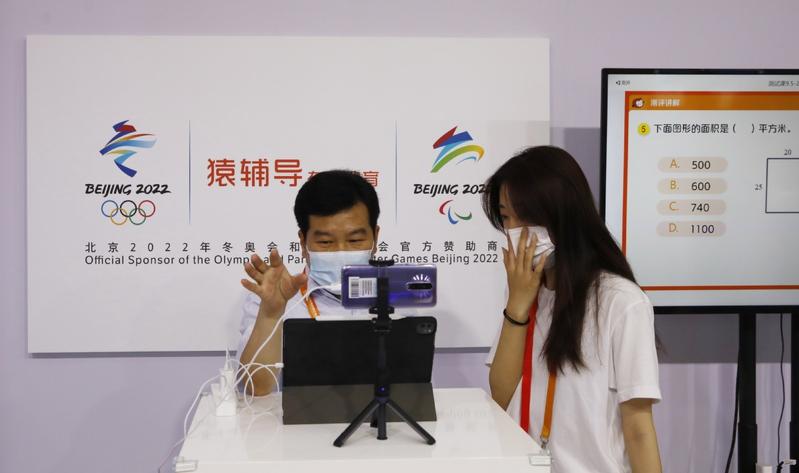 Visitors check out an online education program during an education industry expo in Beijing in September 2020. (PHOTO PROVIDED TO CHINA DAILY)
Visitors check out an online education program during an education industry expo in Beijing in September 2020. (PHOTO PROVIDED TO CHINA DAILY)
China's measures to support new types of consumption will drive flexible employment and more technological innovation within the online education sector, according to industry experts.
"The country's efforts to spur new consumption models, including online education and New Retailing, will create more jobs in these sectors," said Wang Peng, an associate professor at the Hillhouse Research Institute, the Renmin University of China in Beijing.
"At the same time, such emerging consumption models will offer new application scenarios for technologies, which in turn will further stimulate the country's technological innovations for fresh economic drivers," Wang said.
The action plan unveiled by the National Development and Reform Commission and 27 other ministries called for more efforts to push forward the orderly development of the online education sector and highlighted the necessity to "boost new occupations" in online education
The remarks came as the National Development and Reform Commission and 27 other ministries unveiled an action plan last week to further cultivate new types of consumption and promote the growth of both online and offline consumption.
Industry experts said the move is aimed at boosting demand-side measures to better unleash pent-up consumer demand, boost innovation-driven development and inject new impetus into the economy.
Notably, the action plan called for more efforts to push forward the orderly development of the online education sector and highlighted the necessity to "boost new occupations" in online education.
ALSO READ: Online-offline integration 'new normal' for education industry
As the sector witnessed soaring development due to surging demand for remote online study during the COVID-19 pandemic, a rising number of young graduates with higher education degrees jumped on the bandwagon of online education.
Therefore, "online education tutors" stood out to become one of the nine new professions launched by the nation's human resources authority. Online education tutors mainly leverage digital learning tools to support students.
"The emerging profession of online education tutors can avail themselves of technical tools, including big data analysis, AI recognition and production-assisted tool development to offer personalized, accurate, timely and effective learning and evaluation feedback," said Xiong Bingqi, deputy director of the 21st Century Education Research Institute.
"It will relieve the biggest bottleneck of the sector-solving the problem of personalization and interactivity-and enable online education to truly help individuals in the internet age," Xiong said.
The action plan said the country may promote the government's purchase of high-quality online education services and encourage the active participation of society at large to join the development of education informatization.
The China Internet Network Information Center recently said that the nation's internet users now stand at 940 million, with 381 million people using online education, 199 million engaged in telecommuting and 276 million availing themselves of online healthcare services.
"The online education sector is quickly penetrating into many corners of the nation, which has injected fresh growth impetus for the country's new economic development," said Zhang Lijun, an education veteran and partner of Sinovation Ventures, a venture capital firm founded by noted investor Kai-fu Lee.
Consultancy iiMedia Research said China's online education sector saw higher sales revenue of 485.8 billion yuan (US$74.2 billion) last year compared with 387 billion yuan in 2019.
Despite the general economic downturn due to the COVID-19 pandemic, online education has been one of the few growth areas in the country.
Zuoyebang, China's largest online education startup in terms of users, raised US$1.6 billion in December while Yuanfudao, a Beijing-based online education startup, raised a whopping US$2.2 billion from two funding rounds in October. Capital infusions are a huge contrast to less than US$500 million that top education startups could barely muster a year ago.
"The capital market supported online education companies as investors are optimistic about the development prospects of the sector, which is essentially their estimate of the scale of a company in the field," said Zhou Feng, CEO of Youdao Inc, in an earlier interview.
READ MORE: Education technology: Going beyond online teaching
"It means that the online education sector is far from reaching the zero-sum stage. It is still an incremental market for China and has great room for growth," Zhou said.


